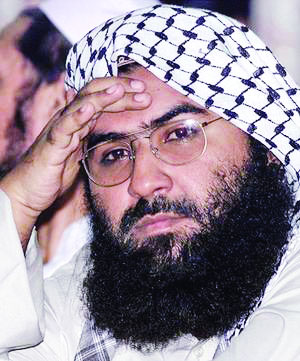Now that the UN has tagged the Jaish chief a global terrorist, it is a diplomatic coup for India and its standing in the world
This is closure at so many levels, the UN declaration of Jaish-e-Mohammad (JeM) chief Masood Azhar as a global terrorist. For common Indians, this is comeuppance for a series of terror attacks that began with the Kandahar hijacking besides the brutal blasts and suicide squads that we have lived with for two decades. Besides costing us human lives, they have also hurt our institutional pride by attacking the Indian Parliament no less. It’s a big win for Indian diplomacy, which has been in lobby wars from the Capitol Hill to the UN, to convince the world that Pakistan-exported terrorism was not just a byproduct of regional conflicts but a sub-set of global terrorism and that the West had as much of a common cause as us. It’s also the first time that India at least painted China into a corner with world opinion on its side, though it had to concede ground on the wording of the ban order, making it look equidistant from both India and Pakistan. Finally, though the final resolution did not mention the Pulwama attacks, the fact that the global ban follows the worst terrorist attack in Kashmir, that, too, on security forces, is acknowledgement enough of the context and Pakistan’s hand in fomenting terrorism in Kashmir. Of course, the biggest political capital has been claimed by the Narendra Modi government, during whose tenure the impossible task of proscribing Azhar has been achieved. In the middle of the Lok Sabha elections, this only lends credence to the ruling BJP’s twin planks of muscular nationalism and national security. It silences the criticism of Balakot being a misadventure, shows that Pakistan can be brought to book by staying well under the nuclear threshold and demonstrates to the world that a usually pacifist India will no longer be a pushover. As for Modi himself, who has already arrogated to himself the task of protecting the nation’s interests, the US-led move posits him as a tall leader the world wants to do business with. Regardless of what concessions that superpower extracts from us, maybe a quid pro quo on Iran.
Getting China on board was the biggest obstacle despite India working with international allies relentlessly. Beijing had put a technical hold on the Azhar ban in the Security Council’s 1267 Al Qaeda Sanctions Committee not once but four times. Given the strategic depth of the Sino-Pak friendship, one that is often reiterated by President Xi Jinping, it seemed unlikely that China would ever give in. Particularly considering Pakistan was whole-heartedly participating in its Belt and Road Initiative (BRI) and ensuring no IS activity was directed its way. But when the US pushed for an independent Security Council resolution, where China would have had to explain its veto and risk being tagged a pariah, the latter agreed to the ban albeit with conditions, prime among them being no mention of Pulwama or Kashmir. Besides, both India and the US also approved China’s presidentship of the Financial Action Task Force (FATF) that caps terror funding and it did look the other way when Pakistan was put on the grey list. The US-India-China equation was calibrated so well that each side could factor in sensitivities of the other and accommodate each other without appearing to have cut a compromise. Given India’s intransigence on BRI, China has already worked out an alternative space through the Wuhan dialogues. Even before the UN meeting, Indian Foreign Secretary Vijay Gokhale went to Beijing, held talks with Chinese Foreign Minister Wang Yi and shared evidence of JeM’s involvement in the Pulwama terror attack. In fact, France, which spearheaded the UN resolution, was the only one which mentioned Pulwama as the last straw on the camel’s back. “For many years now, French diplomacy has been relentlessly pleading for sanctioning Azhar, head of the terrorist group responsible, notably, for the Pulwama attack last February,” it said.
What does it mean for Azhar and other terror networks in Pakistan? Yes, there will be an arms and funds freeze as well as a travel ban and confinement. But when it comes to Jaish and the Lashkar before it, they mutate in hibernation and cadres emerge with a new face, style and identity. By the time they are circled out, much damage is done. So clamping down on Pakistan’s hydra-headed terror networks is still quite a bit.
Writer & Courtesy: The Pioneer








 OpinionExpress.In
OpinionExpress.In















Comments (0)